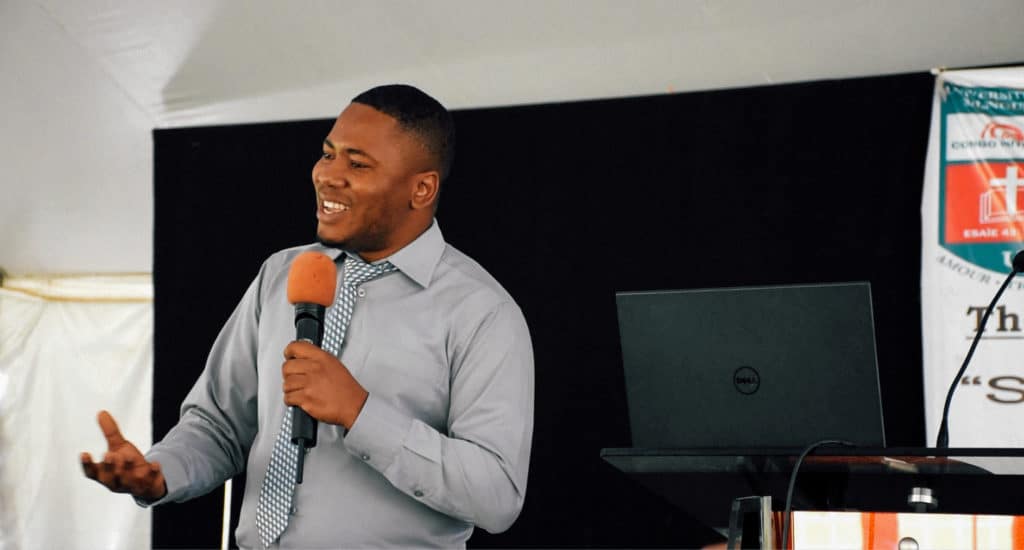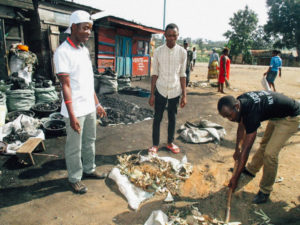Each June, advocates around the world come together for World Environment Day, a celebration and movement that draws attention to the most pressing environmental issues of our time. It is no surprise that UCBC students and staff join the global community in this effort, hosting every year a week-long initiative that promotes “Creation Care.”
At UCBC, “Creation Care” is a long-standing commitment of the university and its students since it’s first academic year (2007). Students and staff embody in their studies and service what their ancestors and Christian faith has taught them – “stewardship of creation is our human vocation.”¹
This year, Don Joseph Mukombozi, a UCBC law faculty member who also holds a Master’s in Environmental Studies, was the keynote speaker during Creation Care week. He focused on the connection between environmental stewardship and the first creation stories in which God gives humans dominion over the fish of the sea, the birds of the air, and the animals of the land (Gen 1:1-2:4).
Traditionally, we have distorted the mandate ‘to exercise dominion’ to mean that creation was made for human beings and that we have a right to dominate and exploit creation for our own wants and needs. This assumption has led to incalculable abuses of nature. However, we know that the Hebrew word for dominion does not mean ‘to dominate’ or ‘to exploit.’ Rather, it means “to take responsibility for” as a ruler would be responsible to ensure the well-being of those in the realm,” he said.

Mukombozi suggested that exercising responsibility as part of God’s creation is the main reason humans were created. Therefore, stewardship of creation is foundational to what it means to be human. Caring for creation is not “an add-on” or a “sideline project.” It is not just part of our calling. It represents our proper human relationship to our earth.

While Mukombozi set the theological tone for the week, UCBC alumnus, Franck Amisi, spoke on one of the greatest environmental challenges of our time and this year’s global theme, “Fighting Plastic Pollution.”
“To change the future, we all have a role to play. All of us need to come together and take action to address the greatest environmental challenges of our time. This theme invites us all to think about how to change our daily habits in order to alleviate the burden of plastic pollution on our natural spaces, wildlife, and our own health. As plastic is a useful material, we have become too dependent on single-use or disposable plastic resulting in serious environmental consequences. Through this week of creation care, we invite our partners here and local to strengthen awareness and actions as one force, to fight plastics pollution permanently,” Amisi said.
In Congo, the lack of good governance and protection of the environment makes it difficult to implement policies and legislation. As Amisi explained,
“In Congo, poor waste management is one cause of disease and pollution in many cities. The majority lack regulations, awareness and proper facilities for waste, including infectious and toxic items. In Beni, people do not know what to do with the garbage piling up all over the city. The lack of good waste management policy poses serious problems that can prove disastrous. In several quarters of Beni, there is no public trash and the inhabitants are forced to throw the waste either in the street or streams.”

This challenge in Beni is just another opportunity for UCBC to raise awareness and lead the community in taking better care of the environment. Towards the end of the week, students and staff participated in a special work program at Mayangose market. The market hosts a number of vendors who serve the area surrounding UCBC. Students spent the day cleaning up trash and plastic, setting an example and teaching the community best practices in disposing of waste
¹ Rhoads, David. 2006. Stewardship of Creation. Retrieved from http://www.lutheransrestoringcreation.org/


Leave a Reply